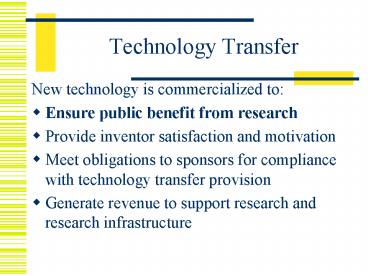Technology Transfer
1 / 8
Title: Technology Transfer
1
Technology Transfer
- New technology is commercialized to
- Ensure public benefit from research
- Provide inventor satisfaction and motivation
- Meet obligations to sponsors for compliance with
technology transfer provision - Generate revenue to support research and research
infrastructure
2
Intellectual Property Policy
- Board of Regents Policy Agreement
- Bayh-Dole Act ( P.L. 98-620 and 37 CFR Part 401)
- Tax Reform Act of 1986
- Internal Revenue Service Procedure 97-14
Regarding Guidelines for Research Agreements,
Issued Jan. 10, 1997
3
Internal Revenue Service Procedure 97-14
Regarding Guidelines for Research Agreements,
Issued Jan. 10, 1997
Purpose To set forth conditions under which a
research agreement does not result in private
business use under 141 (b) of the Internal
Revenue Code of 1986.
Section 5.02. any license or other use of
resulting technology by the sponsor is permitted
only on the same terms as any unrelated,
non-sponsoring party (that is, the sponsor must
pay a competitive price for its use), with the
price paid for that use determined at the time
the license or resulting technology is available
for use
4
In research grants and contracts not sponsored by
the federal government
- A university will generally claim title to the
technology. - A university may offer the sponsor a
non-exclusive license to technology for internal
use - A university may sometimes offer the sponsor a
first option to an exclusive license to resulting
technology on fair and reasonable terms to be
negotiated. - A university will usually retain the right to
practice the technology in research and
education. - A university will not generally obligate
background rights. - Potential conflicts of interest for those
responsible for the design, conduct, or reporting
of research must be managed.
5
The Best for Less
- When a company sponsors research at a university
- it has access to buildings, facilities, and
research resources built with public funds - it does not pay for the full costs of the
research since most universities have capped
indirect costs - there are generally no fixed fees by which
private research labs recover IRR costs
6
Technology Transfer
- For a faculty member, a patent is the ultimate
publication - Russ Lea, NCSU
7
- A start-up company can be the best available
licensee and best able to bring a new technology
to the market.
8
Issues Raised by Faculty Start-up Companies
- Conflict of interest
- Conflict of commitment
- Sponsorship of research at the university and the
role of the principal investigator - Use of university facilities by the company
- Use of the universitys name by the company
- The employment of current university students by
the company - The role of the universitys students in the
companys research - The relationship of research supported by the
company to other research in the same area
supported by other sponsors - Consulting by the faculty member for the company
- The use of donations the company may make to
university - The risk that state funds will inadvertently be
used to benefit a private company or state
employees - Treatment of the proceeds of the universitys
equity in the start-up if equity was accepted as
part of the licensing fee and if the faculty
member also holds equity in the company































